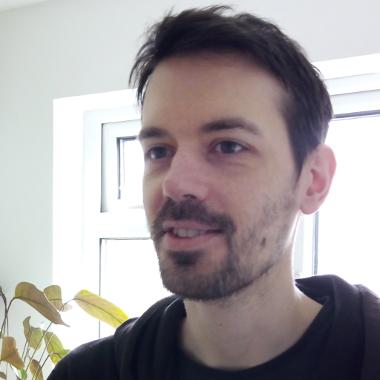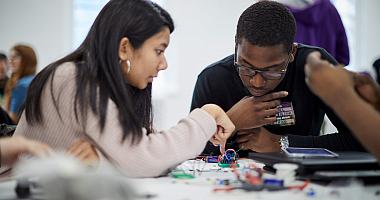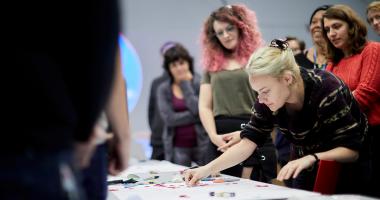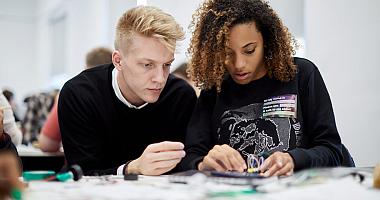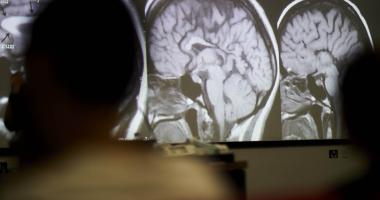BSc (Hons)
Creative Computing
Whether you’re interested in creative coding, digital art, electronic music, or app and games development, this degree will prepare you for a technology-focused career in the creative industries.
Content navigation menu
Why study BSc Creative Computing at Goldsmiths
- BSc Creative Computing helps you develop the creative, technical and critical thinking skills essential for a career in creative technology and related areas – whether you're interested in app and games development, audio-visual effects, social media, digital art or digital advertising.
- You’ll learn creative technology skills from the ground up. You don't need to know how to code before you join the course: we begin with the basics and build you up to a professional industry standard.
- We’ll teach you multiple coding languages, covering areas such as graphics and sound, physical computing, creative AL and full-stack web development.
- The degree will nurture your development not just as a technical expert, but also as a creative thinker, allowing you to learn and explore through a combination of technology and imagination.
- This degree is hands-on and practical from the start. You’ll create your own games, apps, digital artwork and interactive music systems. By working on practical projects throughout your degree you’ll build a relevant skillset for your future career.
- In your third year, you'll have the opportunity to undertake a year-long industry placement (making this programme four years full-time, or six years part-time). This gives you valuable experience to build confidence and contacts, further develop your skills and industry insight, and enhance your career prospects.
Contact the department
If you have specific questions about the degree, contact Dr Jamie Forth.
UCAS code
G452
Entry requirements
A-level: BBB
BTEC: DDM
IB: 33 points overall with Three HL subjects at 655
Length
3 years full-time; 4 years full-time with a placement year; 6 years part-time
Fees
Home - full-time: £9250
Home - part-time: £4625
International - full-time: £20160
Department
Related degrees
You may also be interested in the following Goldsmiths degrees that combine creative and technical skills:
What you'll study
Overview
From the start of your degree, you’ll be developing your own creative projects, which will increase in scale and ambition. As your degree progresses, you will personalise your studies by choosing from our range of option modules, including physical computing, artificial intelligence, virtual and augmented reality, machine learning, and digital performance.
You will learn creative thinking and design techniques by studying topics such as generative drawing and user-centred design, and will also develop key professional skills such as teamwork, project pitching, and project management.
Year 1
In your first year, you'll take the following compulsory modules:
| Module title | Credits |
|---|---|
| Introduction to Programming | 15 credits |
| Front End Web | 15 credits |
| Designing Digital Interactions | 15 credits |
| Graphics 1 | 15 credits |
| Sound and Signal 1 | 15 credits |
| Creative Computing Project 1 | 15 credits |
| Identity, Agency & Environment 1 | 15 credits |
| Identity, Agency & Environment 2 | 15 credits |
Note about optional modules (if available): The above is indicative of the typical modules offered, but is not intended to be construed or relied on as a definitive list of what might be available in any given year. The module content and availability is subject to change.
Teaching style
This programme is taught through a mixture of lectures, lab sessions, tutorials and workshops. You’ll also be expected to undertake a significant amount of independent study. This includes working on programming assignments, reading set materials, preparing topics for discussion, and producing essays or project work.
How you'll be assessed
You’ll be assessed by a variety of methods, depending on your module choices. These may include coursework, examinations, group work and projects. If you opt for an industrial placement year, your placement tutor will assess your work. If you complete the placement year successfully, you earn the endorsement 'with work experience' on your degree certificate.
Credits and levels of learning
An undergraduate honours degree is made up of 360 credits – 120 at Level 4, 120 at Level 5 and 120 at Level 6. If you are a full-time student, you will usually take Level 4 modules in the first year, Level 5 in the second, and Level 6 modules in your final year.
Facilities
The Department of Computing has a wealth of specialist labs and facilities that enable students and academics to create cutting-edge work. The facilities range from digital studios to motion capture, and games labs to sonic media.
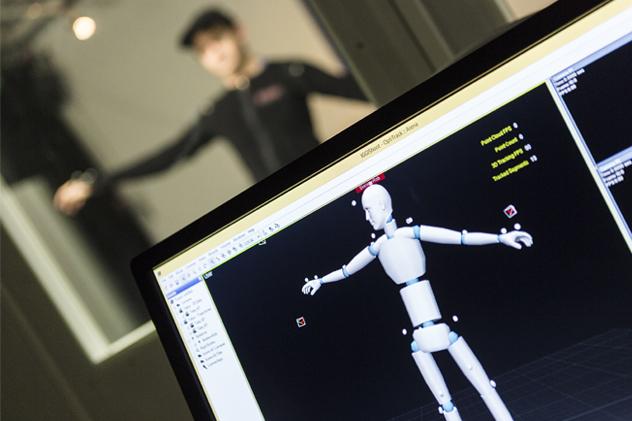
Computing facilities at Goldsmiths include a VR lab equipped with a full multi-camera motion capture studio, similar to that used in the making of Avatar and The Last of Us.
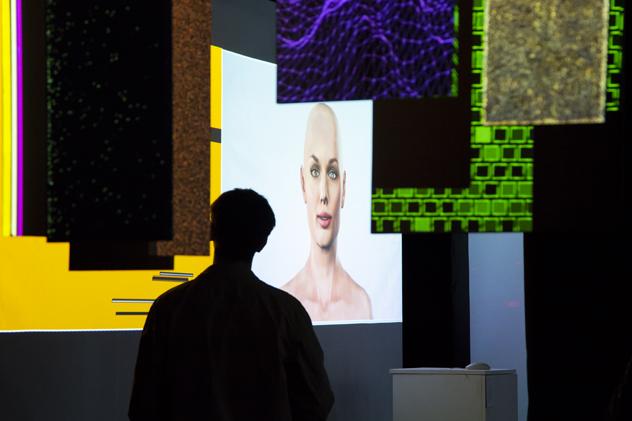
The campus is a creative place, and you'll have the opportunity to be inspired by student work at imaginative events like the annual Goldsmiths degree shows.
Careers
This highly versatile degree is designed to prepare you for a range of careers in the creative technology sector. Graduates will be both technical experts and creative thinkers and makers.
Where do Goldsmiths computing graduates work?
Our graduates have gone on to work in areas such as:
- Machine learning
- Digital public art
- Digital advertising
- User interface and experience design
- Music technology
- Film/TV special effects and post-production
- Software engineering
Some of the recent graduate-level careers for computing alumni have included:
- Machine learning developer
- Mobile developer
- Video game developer
- Computer music/sound engineer
- Full-stack web developer
- Data analyst
- E-learning programmer
- Application programmer
- App developer
- Database manager
Employers include:
The pace of change in the computing sector is rapid, and you may be pursuing careers and using digital methods we cannot yet imagine. You can read more about possible career options after you graduate on our computing careers page.
This programme is also a pathway into Masters-level study in a variety of computing disciplines.
Skills
Throughout the degree you will learn skills including:
- Creative skills such as ideas generation and imagination, and using computation for creative expression
- Technical skills including professional-level programming skills, front-end web development, and learning multiple coding languages (covering areas such as graphics and sound, physical computing, creative AL and full-stack web development)
- Software analysis, design and implementation skills
- An understanding of contemporary computing practice
- Critical, analytical, creative, reflective and interpersonal skills that will prepare you for a career in industry or research, including the ability to work independently and in groups
- Project management
You'll be supported throughout the programme to understand the different potential career journeys you can follow, and to build a portfolio of work to demonstrate your capability to gain employment or freelance work in that area.
Regular guest lectures from industry professionals will support your development of sector knowledge and awareness of different career paths.
Industrial placement year
If you decide to take the industrial placement year, you will develop the practical skills and real-world experience that is sought after by employers.
Some of the companies BSc Creative Computing students have worked at during their work placement year recently include:
MSci study route
Depending on your academic results, you’ll also have the opportunity to continue your studies to MSci level. This will give you an undergraduate Masters-level qualification, and let you delve deeper into the subject by specialising in areas such as virtual and augmented reality (VR and AR). You can find out more about the MSci study route in the programme specification.
Entry requirements
We accept the following qualifications:
A-level: BBB
BTEC: DDM
International Baccalaureate: 33 points overall with Three HL subjects at 655
Access: Pass with 45 Level 3 credits including 30 Distinctions and a number of merits/passes in subject-specific modules
Scottish qualifications: BBBBC (Higher) or BBC (Advanced Higher)
European Baccalaureate: 75%
Irish Leaving Certificate: H2 H2 H2 H2
Additional requirements
If you do not have a Science or Mathematics-based A-level, you should normally have at least Grade B/Grade 6 at GCSE Mathematics.
Alternative qualifications and experience
See our full list of undergraduate entry qualifications.
We welcome students with a range of educational experiences. If you believe you may not meet the standard qualification requirements we would still encourage you to apply because we consider all aspects of your application when making a decision.
We’ll pay particularly careful attention to your personal statement, which is your opportunity to demonstrate your interest in the subject you’ve applied for. Your referees are also welcome to include any relevant contextual comments around your academic achievements. We’ll look at all these things when making a decision on your application, as well as your qualifications and grades.
International qualifications
We also accept a wide range of international qualifications. Find out more about the qualifications we accept from around the world.
If English isn’t your first language, you will need an IELTS score (or equivalent English language qualification) of 6.0 with no element lower than 5.5 to study this programme. If you need assistance with your English language, we offer a range of courses that can help prepare you for degree-level study.
Fees and funding
Annual tuition fees
These are the UG fees for students starting their programme in the 2024/2025 academic year.
From August 2021 EU/EEA/Swiss nationals will no longer be eligible for 'Home' fee status. EU/EEA/Swiss nationals will be classified as 'International' for fee purposes, more information can be found on our fees page.
- Home - full-time: £9250
- Home - part-time: £4625
- International - full-time: £20160
If your fees are not listed here, please check our undergraduate fees guidance or contact the Fees Office, who can also advise you about how to pay your fees.
It’s not currently possible for international students to study part-time if you require a Student Visa, however this is currently being reviewed and will be confirmed in the new year. Please read our visa guidance in the interim for more information. If you think you might be eligible to study part-time while being on another visa type, please contact our Admissions Team for more information.
If you are looking to pay your fees please see our guide to making a payment.
Funding opportunities
We offer a wide range of scholarships and bursaries, and our Careers Service can also offer advice on finding work during your studies. Find out more about funding your studies with us.
Additional costs
In addition to your tuition fees, you'll be responsible for any additional costs associated with your course, such as buying stationery and paying for photocopying. You can find out more about what you need to budget for on our study costs page.
There may also be specific additional costs associated with your programme. This can include things like paying for field trips or specialist materials for your assignments. Please check the programme specification for more information.
Placement year
If you choose to do a placement year, the fee for this year will be different to that listed. Please contact the Fees Office for details.
The programme is convened by Dr Jamie Forth, and in addition you'll learn from other experts across the Department of Computing at Goldsmiths. Staff include:
